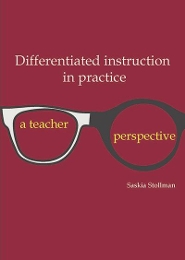
Differentiation in education
Many teachers in secondary education take differences between pupils into account . PhD research by Saskia Stollman (ICLON) shows that they need room to experiment and the support of the school management. Defence on May 23, 2018.
In the context of the project GUTS, Differentiated Challenging of Talent in School (see text box), Stollman investigated which factors influence how teachers apply differentiation, and what they think about it.
Differentiated instruction is difficult

When a teacher differentiates, he or she takes into account the diverse learning needs of pupils and thereby tries to let each student learn as well as possible. Previous research has shown that differentiatied instruction is difficult for teachers and that they apply it not often enough. This is because classes are large (about 25 students with their own learning needs) and teachers have little time to prepare their lessons.
Stollman conducted a literature study to investigate which factors in the work environment of teachers promote or impede differentiated teaching. This study shows that it is important to first map the work context of teachers when applying differentiated instruction.
Teachers' considerations
Stollman also interviewed four teachers who participated in the GUTS project on the basis of video recordings of their lessons. She asked the teachers what they thought during the interactions in the lesson, in order to get the teachers' reflections clear.
The talent development lessons of GUTS seem to give teachers more freedom to experiment with differentiation. They mainly take into account differences in the performance of different pupils. A number of teachers also consider the interests of students.
Room for teachers
The research shows that many teachers are already working on differentiation in their daily teaching practice in their own way, but that they differ in the way they do it. This means that the many initiatives that already exist to support teachers need to be tailored to those differences. In other words: a differentiated supply of support is also important for the development of teachers. In addition, it is important that teachers have room to experiment with differentiatied instruction. For this they must receive sufficient support from the school (management).
Motivation and performance of students seem to become less during the high school period. That is why the project GUTS (Differentiated Challenging of Talent in School) was carried out at a secondary school during three school years. Pupils of the first two years followed eight extra 'talent development lessons' per semester in a subject they liked and were good at. Pupils from the third school year did a personal project in such a subject.
